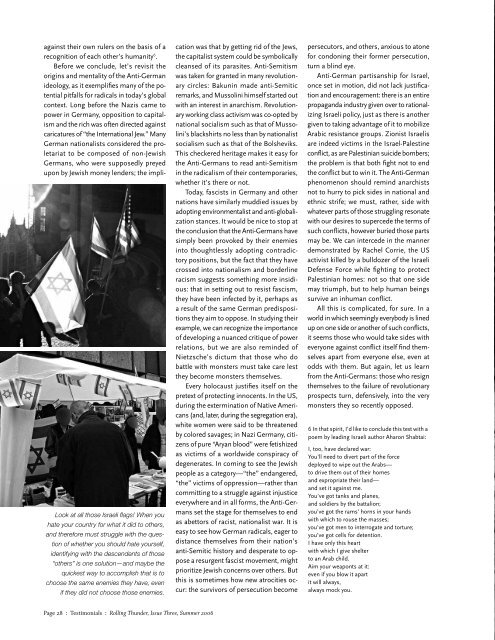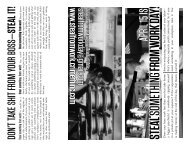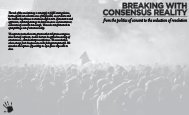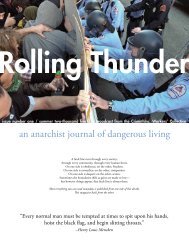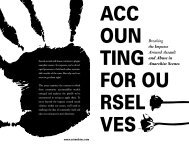Rolling Thunder - CrimethInc
Rolling Thunder - CrimethInc
Rolling Thunder - CrimethInc
Create successful ePaper yourself
Turn your PDF publications into a flip-book with our unique Google optimized e-Paper software.
Look at all those Israeli flags! When youhate your country for what it did to others,and therefore must struggle with the questionof whether you should hate yourself,identifying with the descendents of those“others” is one solution—and maybe thequickest way to accomplish that is tochoose the same enemies they have, evenif they did not choose those enemies.against their own rulers on the basis of arecognition of each other’s humanity 6 .Before we conclude, let’s revisit theorigins and mentality of the Anti-Germanideology, as it exemplifies many of the potentialpitfalls for radicals in today’s globalcontext. Long before the Nazis came topower in Germany, opposition to capitalismand the rich was often directed againstcaricatures of “the International Jew.” ManyGerman nationalists considered the proletariatto be composed of non-JewishGermans, who were supposedly preyedupon by Jewish money lenders; the implicationwas that by getting rid of the Jews,the capitalist system could be symbolicallycleansed of its parasites. Anti-Semitismwas taken for granted in many revolutionarycircles: Bakunin made anti-Semiticremarks, and Mussolini himself started outwith an interest in anarchism. Revolutionaryworking class activism was co-opted bynational socialism such as that of Mussolini’sblackshirts no less than by nationalistsocialism such as that of the Bolsheviks.This checkered heritage makes it easy forthe Anti-Germans to read anti-Semitismin the radicalism of their contemporaries,whether it’s there or not.Today, fascists in Germany and othernations have similarly muddied issues byadopting environmentalist and anti-globalizationstances. It would be nice to stop atthe conclusion that the Anti-Germans havesimply been provoked by their enemiesinto thoughtlessly adopting contradictorypositions, but the fact that they havecrossed into nationalism and borderlineracism suggests something more insidious:that in setting out to resist fascism,they have been infected by it, perhaps asa result of the same German predispositionsthey aim to oppose. In studying theirexample, we can recognize the importanceof developing a nuanced critique of powerrelations, but we are also reminded ofNietzsche’s dictum that those who dobattle with monsters must take care lestthey become monsters themselves.Every holocaust justifies itself on thepretext of protecting innocents. In the US,during the extermination of Native Americans(and, later, during the segregation era),white women were said to be threatenedby colored savages; in Nazi Germany, citizensof pure “Aryan blood” were fetishizedas victims of a worldwide conspiracy ofdegenerates. In coming to see the Jewishpeople as a category—“the” endangered,“the” victims of oppression—rather thancommitting to a struggle against injusticeeverywhere and in all forms, the Anti-Germansset the stage for themselves to endas abettors of racist, nationalist war. It iseasy to see how German radicals, eager todistance themselves from their nation’santi-Semitic history and desperate to opposea resurgent fascist movement, mightprioritize Jewish concerns over others. Butthis is sometimes how new atrocities occur:the survivors of persecution becomepersecutors, and others, anxious to atonefor condoning their former persecution,turn a blind eye.Anti-German partisanship for Israel,once set in motion, did not lack justificationand encouragement: there is an entirepropaganda industry given over to rationalizingIsraeli policy, just as there is anothergiven to taking advantage of it to mobilizeArabic resistance groups. Zionist Israelisare indeed victims in the Israel-Palestineconflict, as are Palestinian suicide bombers;the problem is that both fight not to endthe conflict but to win it. The Anti-Germanphenomenon should remind anarchistsnot to hurry to pick sides in national andethnic strife; we must, rather, side withwhatever parts of those struggling resonatewith our desires to supercede the terms ofsuch conflicts, however buried those partsmay be. We can intercede in the mannerdemonstrated by Rachel Corrie, the USactivist killed by a bulldozer of the IsraeliDefense Force while fighting to protectPalestinian homes: not so that one sidemay triumph, but to help human beingssurvive an inhuman conflict.All this is complicated, for sure. In aworld in which seemingly everybody is linedup on one side or another of such conflicts,it seems those who would take sides witheveryone against conflict itself find themselvesapart from everyone else, even atodds with them. But again, let us learnfrom the Anti-Germans: those who resignthemselves to the failure of revolutionaryprospects turn, defensively, into the verymonsters they so recently opposed.6 In that spirit, I’d like to conclude this text with apoem by leading Israeli author Aharon Shabtai:I, too, have declared war:You’ll need to divert part of the forcedeployed to wipe out the Arabs—to drive them out of their homesand expropriate their land—and set it against me.You’ve got tanks and planes,and soldiers by the battalion;you’ve got the rams’ horns in your handswith which to rouse the masses;you’ve got men to interrogate and torture;you’ve got cells for detention.I have only this heartwith which I give shelterto an Arab child.Aim your weaponts at it:even if you blow it apartit will always,always mock you.Report from the Hothouse:The Tomato Pickers<strong>CrimethInc</strong>. Field Agent Guero Flaco spent four months working and livingundercover in a forty-two-acre greenhouse complex at the pulsing heart ofNorth America’s greenhouse tomato industry, which relies almost exclusivelyon contracted laborers from Mexico and the Caribbean. He wrote these lettersby flashlight from his bunk inside the warehouse dorm room.In order to protect the folks beside whom he worked, he asks that this article not bereproduced without his permission. He can be reached at chupatinta@gmail.com.Page 28 : Testimonials : <strong>Rolling</strong> <strong>Thunder</strong>, Issue Three, Summer 2006<strong>Rolling</strong> <strong>Thunder</strong>, Issue Three, Summer 2006 : Testimonials : Page 29


